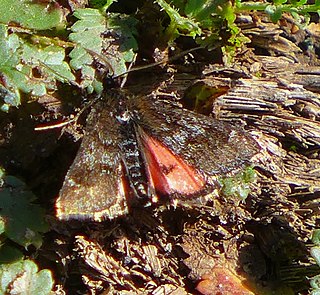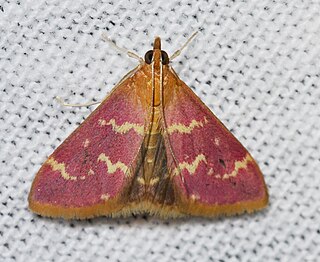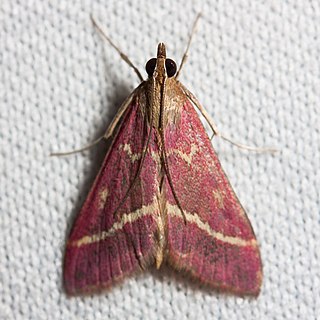
Pyrausta is a speciose genus of moths of the family Crambidae. The genus was erected by Franz von Paula Schrank in 1802.

Euxoa is a genus of moths of the family Noctuidae raised to Genus by the German entomologist, Jacob Hübner. The Genus is mostly confined to dry and semi dry areas in the Northern Hemisphere. There 130 species in Eurasia, a few in Africa, and 175 in North America. There are no species in the Genus in South-East Asia or in Australia. In North America, most species are found in Western regions. Of the North American species, 4 are endemic to Mexico. There is one species recorded from Chile, but this may be a mislabeled specimen. In real terms, species numbers do not equal species abundance. Some areas with few species have large numbers of the ones that do live there.

Pyrausta acrionalis, the mint-loving pyrausta moth, is a moth of the family Crambidae. It is found in eastern North America, including Alabama, Georgia, Massachusetts, Mississippi, New Hampshire, New York, Ontario, Tennessee, West Virginia and Wisconsin.

Arta statalis, the posturing arta moth, is a species of snout moth in the genus Arta. It was described by Augustus Radcliffe Grote in 1875 and is the type species of its genus. It is found in North America including Delaware, Florida, Georgia, Illinois, Iowa, Massachusetts, New Jersey, New York, North Carolina, Oklahoma, Pennsylvania, South Carolina, Tennessee and Virginia.
Pyrausta atropurpuralis is a moth in the family Crambidae. It was described by Augustus Radcliffe Grote in 1877. It is found in North America, where it has been recorded from Texas, New Mexico and Colorado.

Pyrausta bicoloralis, the bicolored pyrausta moth, is a moth in the family Crambidae. It was described by Achille Guenée in 1854. It is found in North America, where it has been recorded from Nova Scotia south to Florida, west to Michigan and Texas. In the south, the range extends to South America.

Pyrausta corinthalis is a moth in the family Crambidae. It was described by William Barnes and James Halliday McDunnough in 1914. It is found in Mexico and the United States, where it has been recorded from California and Arizona.

Pyrausta dapalis is a moth in the family Crambidae. It was described by Augustus Radcliffe Grote in 1881. It is found in western North America, where it has been recorded from California and Oregon.

Pyrausta flavofascialis is a moth in the family Crambidae. It was described by Augustus Radcliffe Grote in 1882. It is found in North America, where it has been recorded from western Texas to Arizona. It is also found in Mexico.

Pyrausta generosa is a moth in the family Crambidae. It was described by Augustus Radcliffe Grote and Coleman Townsend Robinson in 1867. It is found in North America, where it has been recorded from Ontario to Alberta and to Florida and Missouri. The habitat consists of undisturbed areas in aspen parkland and mixed woods.

Pyrausta lethalis, the lethal pyrausta moth, is a moth in the family Crambidae. It was described by Augustus Radcliffe Grote in 1881. It is found in North America, where it has been recorded from California to southern Nevada, southern Arizona and Texas.

Pyrausta nexalis, the fulvous-edged pyrausta moth, is a moth in the family Crambidae. It was described by George Duryea Hulst in 1886. It is found in North America, where it has been recorded from Washington, Montana, Arizona, California, New Mexico, Oklahoma, Texas and Utah.

Pyrausta nicalis is a moth in the family Crambidae. It was described by Augustus Radcliffe Grote in 1878. It is found in North America, where it has been recorded from Quebec west to British Columbia, south to Colorado, Utah, Nevada and California.
Pyrausta pilatealis is a moth in the family Crambidae. It was described by William Barnes and James Halliday McDunnough in 1914. It is found in North America, where it has been recorded from California and eastern Washington.

Pyrausta rubricalis, the variable reddish pyrausta moth, is a moth in the family Crambidae. It was described by Jacob Hübner in 1796. It is found in North America, where it has been recorded from Illinois to New York, south to Florida and Louisiana. It is also reported from the west coast, from southern California to Washington. The wingspan is about 15 mm and adults have been recorded on wing from March to October.

Pyrausta signatalis, the raspberry pyrausta moth, is a moth in the family Crambidae. It was described by Francis Walker in 1866. It is found in North America, where it has been recorded from British Columbia to Ontario, south to North Carolina, South Carolina, Texas and Arizona. The habitat consists of aspen parkland and grasslands.

Pyrausta socialis, the sociable pyrausta moth, is a moth in the family Crambidae. It was described by Augustus Radcliffe Grote in 1877. It is found in North America, where it has been recorded from Ontario west to British Columbia, south to Montana and Colorado.
Pyrausta tatalis is a moth in the family Crambidae. It was described by Augustus Radcliffe Grote in 1877. It is found in North America, where it has been recorded from California to Texas and Oklahoma.

Pyrausta volupialis, the volupial pyrausta moth, is a moth in the family Crambidae. It was described by Augustus Radcliffe Grote in 1877. It is found in North America, where it has been recorded from Oklahoma, Utah, Texas, Colorado, New Mexico, Arizona and California to Chiapas, Mexico.
Udea vacunalis is a moth in the family Crambidae. It was described by Augustus Radcliffe Grote in 1881. It is found in North America, where it has been recorded from California.
















